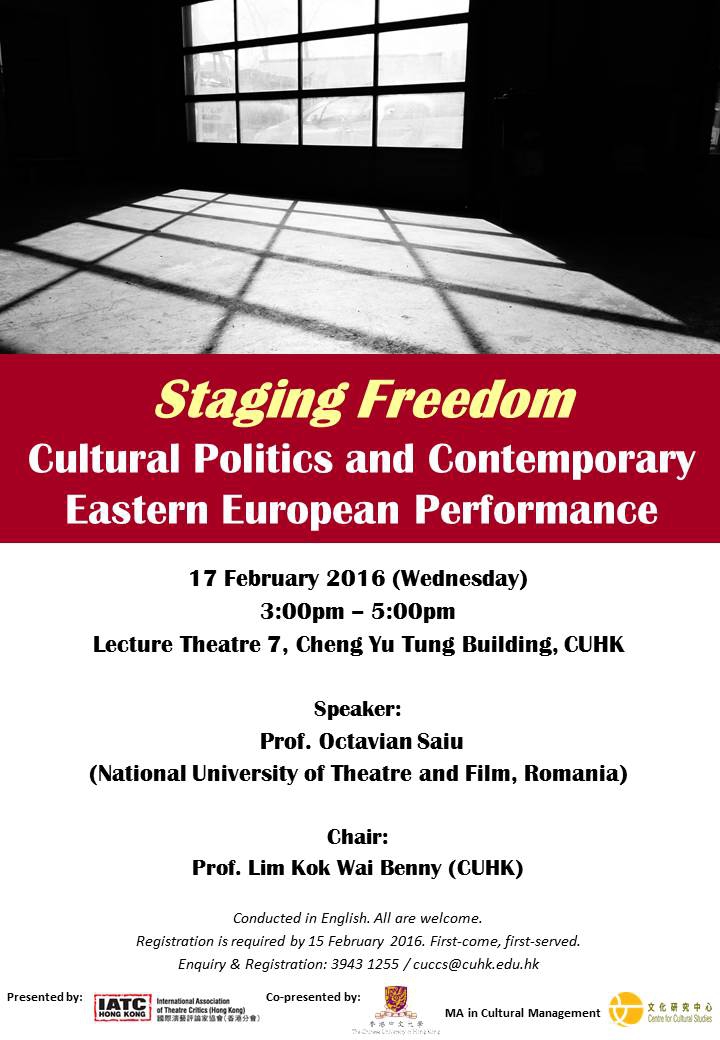活动
Staging Freedom: Cultural Politics and Contemporary Eastern European Performance
2016年2月17日
3:00pm – 5:00pm
Lecture Theatre 7, Cheng Yu Tung Building, CUHK
Prof. Octavian Saiu (National University of Theatre and Film, Romania)
Octavian Saiu has taught theatre and dramatic literature as Associate Professor at the National University of Theatre and Film (NUTF) in Bucharest, Romania and as Guest Lecturer at the University of Otago in New Zealand. He was Visiting Fellow at the University of London, School of Advanced Study(2008,2011), and Visiting Professor at Meiji University in Tokyo and The Lisbon Consortium (2013-present).He holds a PhD in Theatre Studies from NUTF, with a thesis about theatrical space, and a PhD in Comparative Literature from the University of Otago, with a thesis about Samuel Beckett and Eugene Ionesco. Since 2004, he has been the Chair of the Conferences of Sibiu International Theatre Festival. Since 2014, he is the Chair of the Shakespeare International Conference, organized by Craiova International Shakespeare Festival in partnership with International Association of Theatre Critics (IATC). In 2013 he was the chair of the Samuel Beckett Conference at Edinburgh International Festival. Since then, he has been involved in the Conference Programme of Edinburgh International Festival as speaker and chair. Recently, in August 2015, he chaired three sessions, including the Symposium dedicated the theatre company, Complicite. He is currently the Adjunct Secretary General of IATC and Director of ‘Eugene Ionesco – Samuel Beckett’ Research Centre. He received the Critics’ Award in 2010 and the Award of the Association of Theatre Artists (UNITER) in 2013.
Online registration: http://goo.gl/forms/FbnrBYD7Ll
3943 1255 / cuccs@cuhk.edu.hk
Between severe censorship and virtually unlimited freedom, the stage of Eastern Europe has been defined by significant historical changes. Yet, beyond all such visible transformations, a cultural ethos has remained rather constant. It is reflected in the works of some prominent artists belonging to different countries and generations: from Kristian Lupa to Krzysztof Warlikowski, from Lev Dodin to Andry Zholdak, from Silviu Purcarete to Radu Afrim and a long list could follow. What they have in common, thus distinguishing them from the great figures of western theatre, is a range of aesthetic values involving political awareness and cultural identity, which they managed to translate into universal themes. This interplay between the local and the global, surpassing hybridity and mere glocalism, accounts for a unique sense of cultural specificity in the theatre of Eastern Europe: close and yet essentially different from the western countries of the same continent. Using some key examples from works by directors with distinct creative programmes, the lecture will highlight a possible sense of commonality in their diversity. This unity is equally a consequence of shared history, with all its political implications, and an effect of the present, with the dynamics of newly found freedom. Dealing with a traumatic past and staging current freedom have been indeed the two vital dimensions of a theatrical landscape that is still to be (re)mapped from a theoretical and critical perspective. This lecture will therefore suggest the possibilities of charting a territory that is rich, paradoxical and endlessly fascinating: contemporary Eastern European performance.
Website: http://www.cuhk.edu.hk/crs/ccs


